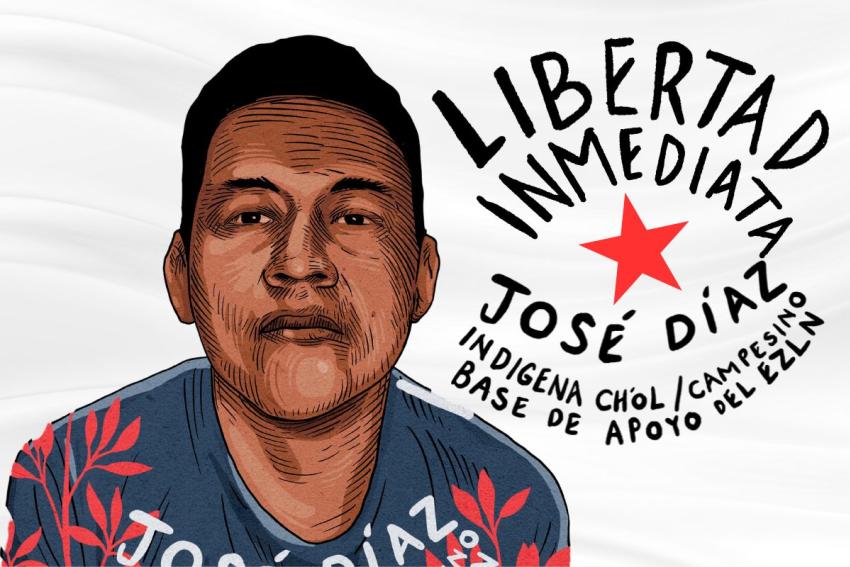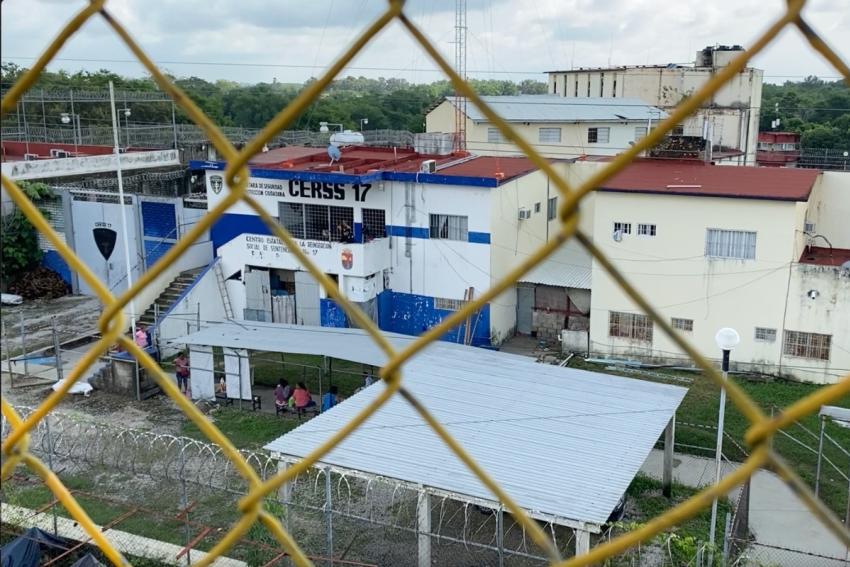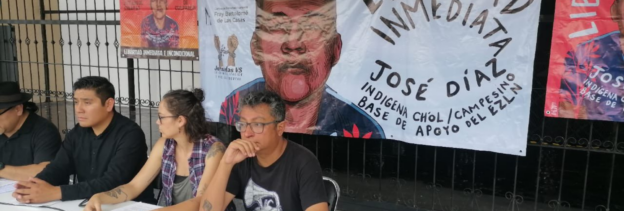José Díaz Gómez, Indigenous Ch’ol, support base of the Zapatista Army of National Liberation (EZLN), has been imprisoned and accused of violent robbery. The Fray Bartolomé de Las Casas Human Rights Center (FRAYBA) pointed out that Díaz, imprisoned in CERSS No. 17, “El Bambú”, in the municipality of Catazajá, in the north of Chiapas, is the victim of criminalization accused of a crime that hasn’t been substantiated.
FRAYBA has documented the human rights violations carried out by Chiapas state police during José Díaz’s detention: executing an illegal and arbitrary detention; engaging in torture; engaging in cruel, inhumane, and degrading conduct; forced disappearance; and holding someone incommunicado.
The organizations demand that the Mexican state immediately free the Zapatista who has been held prisoner for nearly one year and nine months without a conviction. On July 8, the presentation of evidence was completed which will be followed by a verdict from the court.
“The evidence presented against José Díaz is inconsistent and lacks credibility. These details make evident the deficient investigation and lack of fairness in the judicial process,” asserted FRAYBA in a press conference held on July 29 in the capital city of Chiapas, Tuxtla Gutiérrez.
Jorge Luis López, FRAYBA’s lawyer, detailed that evidence presented by the public prosecutor is made up of four parts, “and none of them directly link José to the crime; we would expect that the judge issues an acquittal.”
The lawyer emphasized that one of the pieces of evidence, testimony of the supposed victim, was full of contradictions during the trial. Furthermore, the witness presented at the hearing confirmed that he does not know the accused. The other two pieces of evidence, two reports presented by the State Attorney General’s Office (a field forensics report and a crime scene inspection), “neither of them directly links José to the crime,” emphasizes López.
The human rights center has documented the investigation process carried out by the public prosecutor’s office, of which it assures, “is deficient because it does not comply with the requirement of being objective, nor does it have evidence to link José to the crime.” The human rights center even warns that given the accumulation of irregularities and the lack of solid evidence against José Díaz, just like four other Zapatistas who have arrest warrants out or them, are at risk of being unjustly convicted.
FRAYBA argues that the imprisonment of José Díaz is politically motivated, part of a pattern of fabricating guilt against Indigenous community organizers, emphasizing that “the prosecution didn’t carry out a legal, scientific, and objective investigation.”

“The Judge of Catazajá must consider not only the crime of robbery and an investigation lacking authenticity, but also the situation of political criminalization in the case of human rights defenders belonging to Indigenous communities,” FRAYBA says in a bulletin.
According to López, as part of José Díaz’s defense, the human rights center has met with judicial officials in Chiapas. Before the officials, they requested a change in the pre-trial detention status, arguing that there is justification to free the Zapatista so he can continue his legal process in freedom. This request was denied.
They have also appealed to international organizations like the Inter-American Commission on Human Rights where they also solicited a change in his pre-trial status because of prison conditions and overcrowding in CERSS No. 17 which are inhumane and violating the human rights of the Zapatista.
Prison in Chiapas, Inhumane and Degrading
As part of its documentation, FRAYBA assures that there exists a pattern of human rights violations of people detained in the prisons of Chiapas. Among them they have registered acts of torture, cruel, inhumane, and degrading conduct, as well as conditions of overcrowding, all of which are predominant in these prisons.
CERSS No. 17, in the municipality of Catazajá, is particularly overcrowded. With a maximum capacity of 120 people, the prison currently houses 478 inmates, and maintains practices like holding 18 people in cells that measure nine square meters.

“This situation has increased the risk of infectious diseases, worsened by compromised immune systems. We also note the presence of multiple diseases reflected in skin rashes, symptoms of fever, dizziness, vomiting, and lumps of different sizes, among other side effects…,” denounces the human rights center. It also emphasizes that the conditions worsened for lack of medical attention and lack of disease monitoring to intervene and mitigate the risks of contagion among the prison population.
FRAYBA says that the response from authorities is to forcefully and unjustly transfer the population to other prisons “putting their lives and well-being at risk.”
The litigator explains that due to the enormous number of cases, the public defenders and judges are overwhelmed with work, which doesn’t allow them time to give specific attention to each case. “What this generates is that an Indigenous person who doesn’t know how to read, who doesn’t know how to write, and who doesn’t know the conditions of our penal system, obviously will be imprisoned for more time,” the lawyer points out.
López explains that there is a two-year term limit in which a person can remain in pre-trial detention: “Precisely, before the two years is up, they accelerate the entire process so that they can give a sentence as soon as possible. The concern is that he will be convicted.”
More than 50 organizations from Chiapas, Mexico and around the world called for the immediate freedom of the Zapatista and called for actions in the context of the coming ruling, which is scheduled to be announced on August 6.
Organizations Denounce Criminalization of Imprisoned Zapatista in Chiapas

